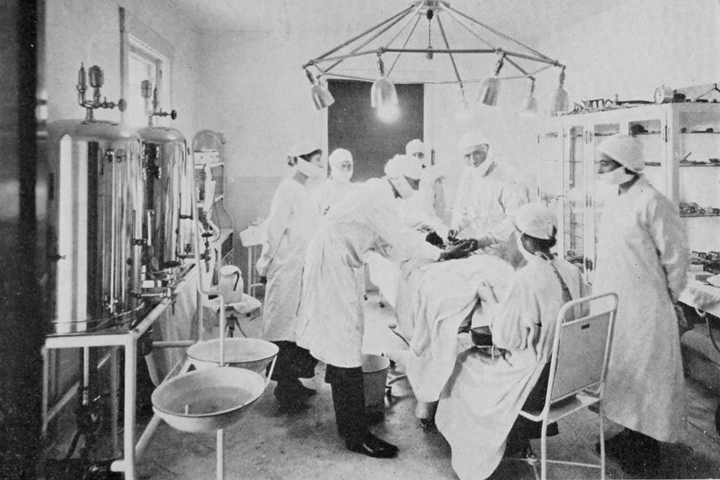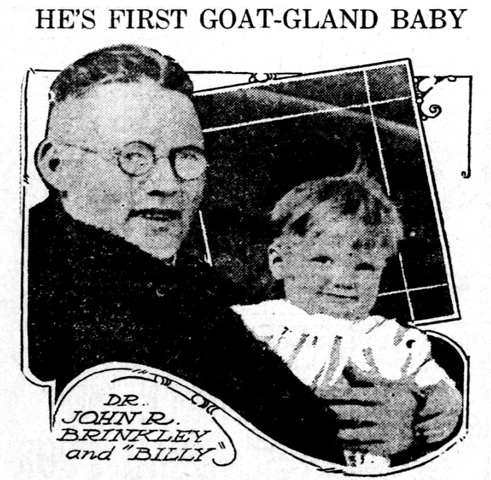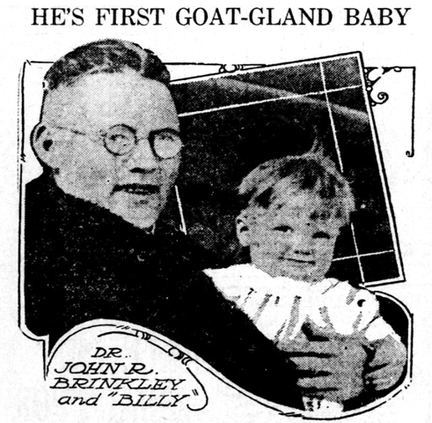Each week we’ll take a step back into the history of Great Bend through the eyes of reporters past. We’ll reacquaint you with what went into creating the Great Bend of today, and do our best to update you on what “the rest of the story” turned out to be.
Last Thursday, High Plains Public Radio’s website presented an article that spoke to a previous Kansas gubernatorial election that was even closer than last Tuesday’s Republican primary.
The story, “The last time a Kansas gubernatorial election was this close it involved goat glands,” by Sam Zeff, crossed our desks, and it was too good not to pass on.
The election in 1930 referred to was a three-way race between Dr. John R. Brinkley, a write-in candidate, Republican Frank Haucke, and Democrat Harry Woodring.
According to Zeff, “Brinkley, who everyone called Doc, is now infamous for a scheme in which he implanted impotent men with goat glands. Men would travel from around the country to his hospital in Milford (about ten miles north of Junction City) for the procedure. They could pick out their own goat from Brinkley’s herd." (The procedure didn’t work.)


According to a Wikipedia page devoted to Brinkley, that wasn’t the extent of Brinkley’s scam artistry. After the wife of his first goat gland transplant happened to get pregnant and gave birth to a baby boy, Brinkley started promoting the glands for every ailment under the sun.
“He started a direct mail blitz and hired an advertising agent, who helped Brinkley portray his treatments as turning hapless men into “the ram that am with every lamb”
Zeff wrote, “Brinkley became a millionaire when he started radio station KFKB (Kansas First, Kansas Best) in the late 1920s. People would mail in descriptions of their ailments and, in a segment called “Medical Question Box,” Doc would prescribe a medicine he invented. The scam: people could only fill their prescriptions at pharmacies where Brinkley had contracts to sell the medicine, and he had deals with drug stores all across the Midwest.
He owned a plane and a yacht, and he built a sewage system and a bandstand in Milford. He also sponsored the local baseball team, the Brinkley Goats.”
He even wore a goatee!
Brinkley’s decision to run for governor may have been driven by pressure from state regulators who were fed up with his antics and were closing in. His medical license was seized, and the Emporia Gazette and Kansas City Star were agitating against him. Even the Federal Radio Commission was ready to close down his radio station, the article stated. He wanted to get into office so he could install people favorable to his enterprises into key positions. He gained support amongst voters by promising free school books, old-age pensions and farm ponds. He didn’t win, but his loss was not by much. With each candidate getting nearly one-third the vote, the winner, Democrat Woodring, won with 251 votes.


“However, some historians believe the only reason Brinkley lost was a dubious legal decision by Attorney General William Smith, who was part of the legal team that had stripped Brinkley of his medical license earlier that year.
“A 1923 Kansas statute allowed voter intent, however a name was written in, to be used in determining a ballot’s validity,” historian Schruben wrote in his 1991 article. “Nevertheless, Attorney General William Smith dictatorially ruled that separate tallies be kept for ballots” with other variations of Brinkley’s name.
If the ballot didn’t read J.R. Brinkley, it was essentially tossed out.
Brinkley never demanded a recount. Some historians speculate that he didn’t want to spend the money even though he had plenty of it.”
Brinkley later moved to Texas after two more election attempts, one as an independent, and one as a Republican. While in Texas, he lost a libel suit he filed against his nemesis, Morris Fishbein, an American Medical Association investigator that followed him from state to state and eventually named him in his two-part series called, “Modern Medical Charlatans.” Brinkley sued him for $250,000. Losing the battle opened him up to more than $3 million in lawsuits from others,and he was forced to file for bankruptcy, and eventually died penniless.
One thing is clear, Brinkley could easily step into the modern era and never miss a beat.
On Tuesday evening , Aug. 15, Kobach held a press conference from his Overland Park office announcing that he had received notice from Jeff Colyer that On Tuesday evening, Aug. 15, Kansas Republican gubernatorial candidate Kris Kobach held a press conference from his Overland Park office announcing that he had received notice from Republican candidate Jeff Colyer that he would concede the election to Kobach.
As of Friday, Aug. 10, Kris Kobach led with only 91 votes. He also announced he would step away from his duties as the state’s election official that day, but Colyer expressed dissatisfaction because Kobach’s top deputy would take over his duties, and that, in Colyer’s opinion, represented a conflict of interest. After all, who wants to be in the position of telling his or her boss that they didn’t win an election? One thing is certain — no one envied Assistant Secretary of State Eric Rucker his position.





